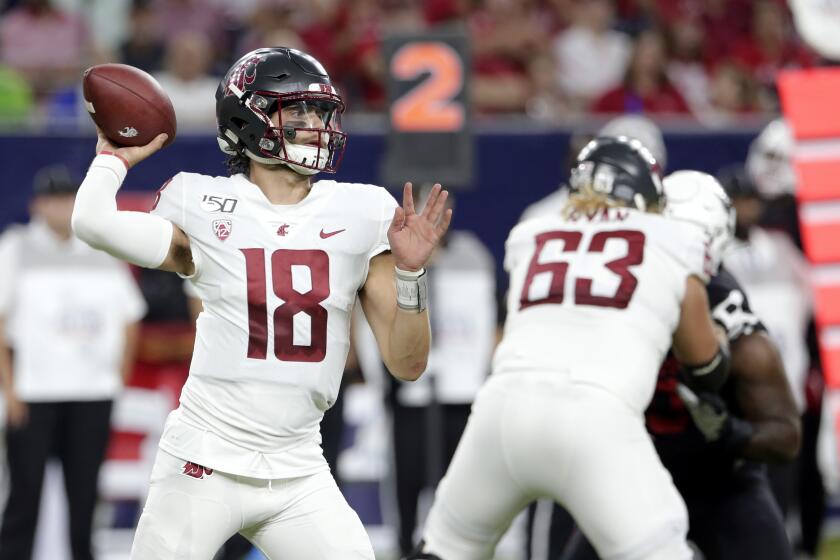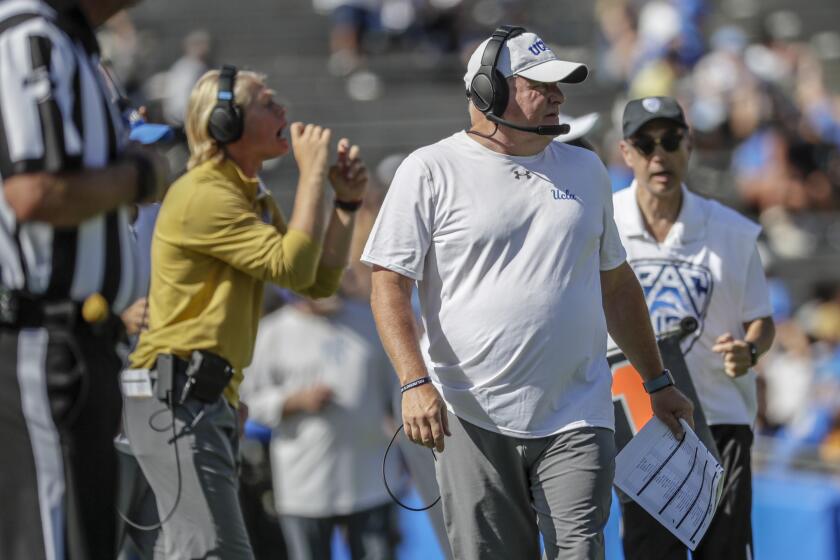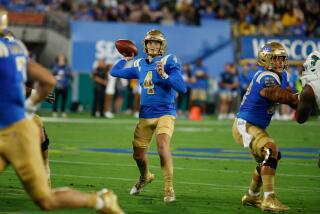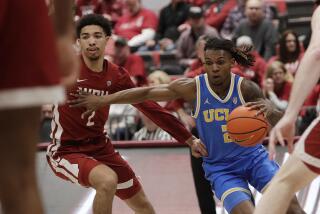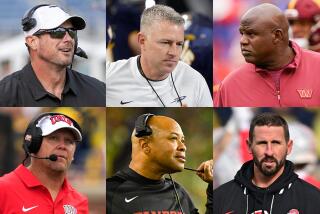Winless UCLA hopes to replicate Mike Leach’s success at No. 19 Washington State
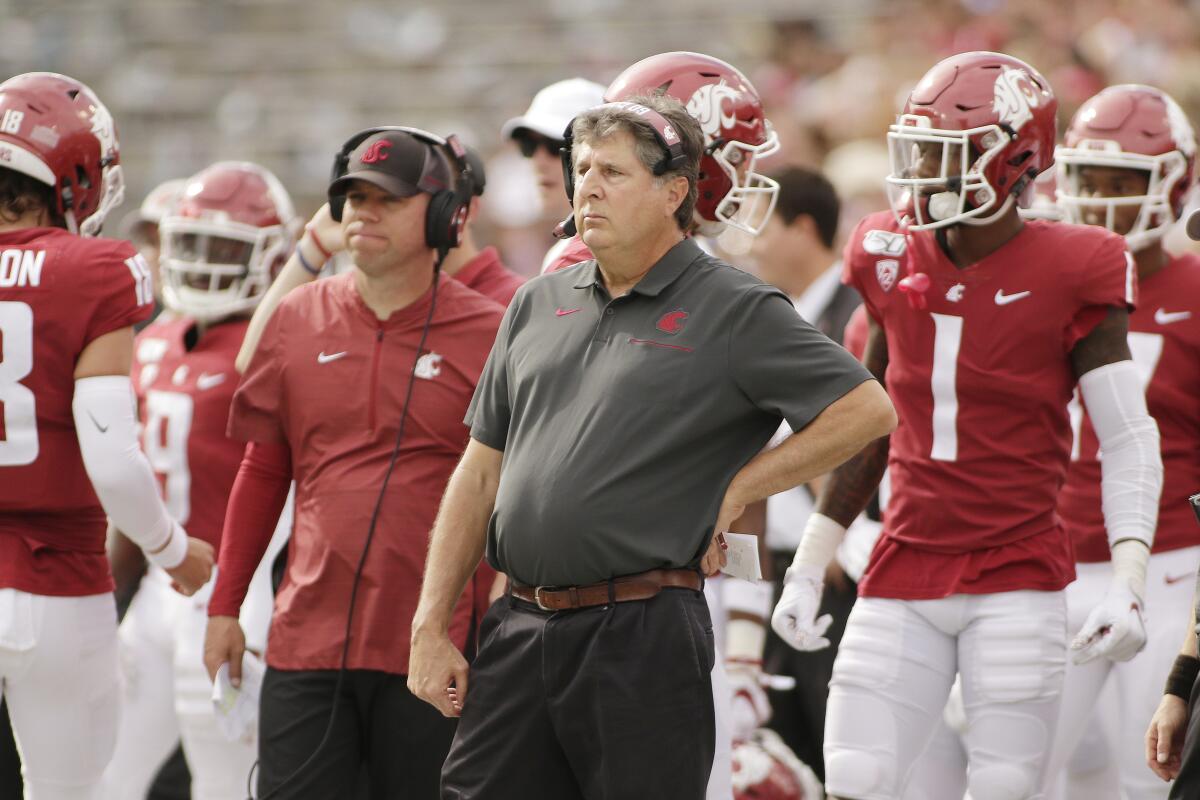
- Share via
PULLMAN, Wash. — Mike Leach had to worry about weights before wins.
When he arrived at Washington State before the 2012 season, eager to revive a football program that had not been to a bowl game in nearly a decade, some players were surprised to learn their new coach expected them to work out year-round.
“I don’t know who was more stunned, me or them,” Leach said this week during a telephone interview, “because I’m [thinking], every high school in America does this, every Division II team in America does this, every Division I-AA team in America does this. Every Division I team damn sure does this — or so I thought.”
The Cougars started the Leach era as if they were pinned on a bench beneath a 500-pound bar. Their early strain resulted in nothing more than a 3-9 record his first season, followed by 6-7 in 2013 and 3-9 in 2014.
Five years later, the Cougars are punching above their weight in the Pac-12 Conference, going to a school-record four consecutive bowl games and annually competing for the North Division title.
It’s a get-there-eventually model that UCLA can only hope to replicate as the winless Bruins (0-3), coming off a 3-9 inaugural season under coach Chip Kelly, prepare to face No. 19 Washington State (3-0) on Saturday night at Martin Stadium in both teams’ conference opener.
UCLA opens Pac-12 play Saturday night on the road against No. 19 Washington State. Here’s how the teams match up.
The comparisons aren’t exact. Washington State, located in what might be described as the end of the Pac-12 earth, has some inherent recruiting disadvantages compared to its conference brethren, and a history that included just seven bowl appearances in the 30 years before Leach’s arrival.
But the Cougars had an identifiable Air Raid offense they could recruit to once Leach undertook the usual change-in-coach player purge — something Kelly recently completed by shedding more than 30 players, a handful of whom medically retired.
Leach said the departures are mutually beneficial when players don’t share a coach’s vision.
“You need guys who buy in and guys who really love football,” Leach said, “and in the interim there can be a certain number that whether they’re playing as much as they’d like or doing as much as they’d like to, there’s a certain amount of selfishness that can set in, and then in some cases they trade the desire to win for everybody having fun and it’s a glorified social club.”
Some players didn’t mask their priorities, Leach said, telling him they wanted to do other things besides football in the off-season and enjoy a robust social life.
“Have whatever social life you want,” Leach said of his retort, “but you’re going to lift and run. I mean, I read an article that said a college Division I scholarship translates to about $80,000 a year when you add all the benefits and perks in there. Well, I mean, if somebody’s got an $80,000-a-year job, lifting and running’s not that much to ask, really.”
Leach eventually benefited from the necessary buy-in among his players. Whether Kelly will get it remains to be seen, though some players have spoken of increased accountability since his arrival.
The Bruins weren’t bereft of talent when Kelly replaced Jim Mora, whose recruiting classes were regularly among the best in the conference, making fans wonder why the early results haven’t been better. And there’s no debating that UCLA has failed to secure a modest portion of the top prospects available in its Southern California backyard.
Kelly has not been able to sell recruits on the blur offense that made him one of the nation’s most coveted coaches while going 46-7 in four seasons at Oregon, explaining that he doesn’t have the veteran players or depth needed to utilize a dizzying tempo. He said he would tailor his offense to his players, but the pro-style scheme he has run has produced just 14 points in every game this season.
UCLA’s 2020 recruiting suffers a defection as Myles Jackson, a linebacker from Georgia, announces that he has decommitted.
Player development has been part of the problem. Sophomore quarterback Dorian Thompson-Robinson has not improved in areas that were obvious weaknesses last season, such as decision-making or making touch passes while on the run. Sophomore running back Martell Irby has fallen out of the rotation after a strong finish to last season. Sophomore guard Christaphany Murray has been getting manhandled after more than holding his own as a freshman.
Kelly defended his staff’s player development but acknowledged it could be a lengthy process.
“I’ve watched a lot of our kids grow as players since they’ve been here and see how they develop and continue to get better on a daily basis,” Kelly said. “The problem with a young team is that people want to it from one day to the next day and that’s not very feasible.”
One strong parallel between the rebuilds of Leach and Kelly is the widespread criticism each faced early in the process. At one point Leach looked like the worst hire among the four coaches who entered the Pac-12 before the 2012 season, given that Mora guided the Bruins to 29 wins in his first three seasons and Arizona’s Rich Rodriguez and Arizona State’s Todd Graham each took their schools to the Pac-12 championship game within three years.
Among the four, only Leach remains.
He said fans disappointed in his early failures couldn’t seem to comprehend how much more deeply the losses stung players and coaches.
“It’s like breakfast,” Leach said. “The chicken’s involved but the pig’s committed. We’re the pigs, you know?”
Leach said UCLA is talented enough to start winning any week now, making him fret that the breakthrough could come Saturday.
“They’ve got some good players,” Leach said between labored breaths, pausing to note he was climbing a massive hill on his nightly walk home.
Realizing the topic, he quickly seized upon the metaphor.
“See, you’ve got to get better,” Leach said, “keep climbing the hill.”
More to Read
Go beyond the scoreboard
Get the latest on L.A.'s teams in the daily Sports Report newsletter.
You may occasionally receive promotional content from the Los Angeles Times.

